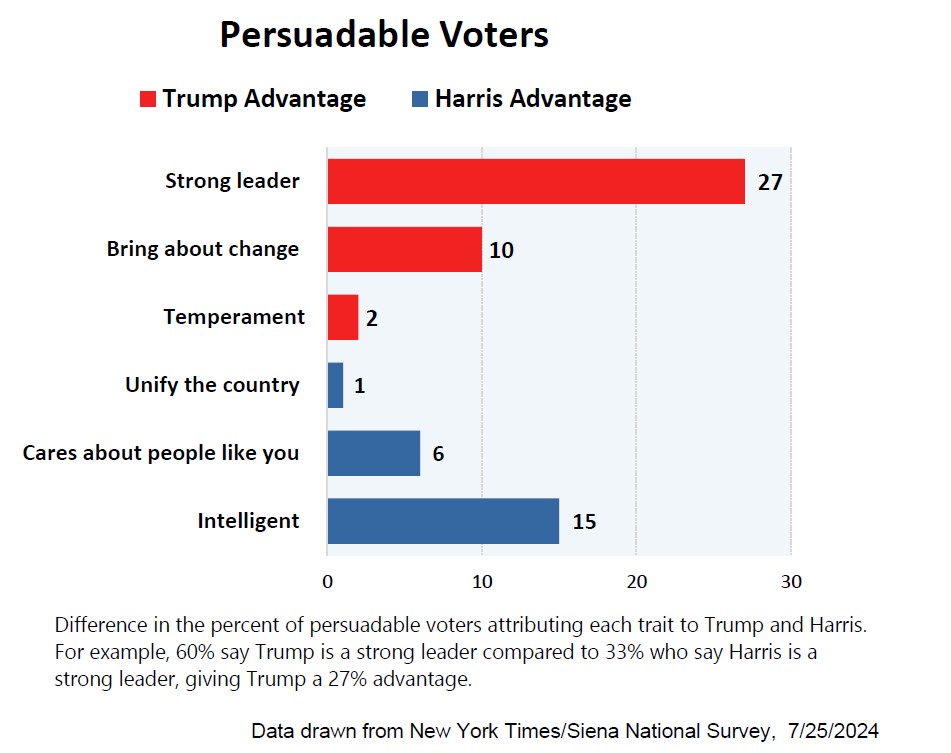
Everything has changed
It is amazing how much can change in a little over a week. Two weeks ago the presidential election appeared set in stone, with most voters’ opinions being locked in place behind their candidate. In our national New York Times/Siena poll conducted right before the Republican National Convention, former President Donald Trump had a 6-point lead over President Joe Biden and nearly 20% of the electorate were identified as ‘double haters’ viewing both candidates unfavorably.
Fast forward to today, and the landscape looks very different. President Biden has left the race and endorsed Vice President Kamala Harris. A solid 6-point lead for Republicans two weeks ago is now barely a one-point advantage, and ‘double haters’ now defined as being negative on both Trump and Harris have dropped from 20% to just 8% of the electorate. This shift, where 12% of the electorate exited the double hater category, represents meaningful changes for both sides. Trump is demonstrating enhanced favorability after the convention and the failed assassination attempt – but for Democratic-leaning voters who were previously not ready to vote for Biden, it’s a whole new ballgame with Kamala Harris in the race.
An election that appeared to be Trump’s to lose is now dead even. Support for Trump is 48% and support for Harris is 47% when we include leaners. That makes up 95% of the electorate. For the overwhelming majority of these voters (84%) support for Trump and Harris is ‘carved in granite’ – they report not being open to voting for the other person. The ‘granite’ voters may or may not know everything about Harris but they know she is not Joe Biden and more importantly for them, not Donald Trump. Their vote is essentially in.
This leaves both sides seeking to understand where in the electoral landscape there may still be opportunities to gain an advantage.
Persuadable Voters
Enter the Persuadables. The Persuadables are those voters who have not ruled out voting for either candidate. In our most recent NYT/Siena poll, truly persuadable voters make up 13% of the US electorate. Trump leads Harris by nearly 9-points (37% to 28%) among ‘leaners’ (or persuadables with some opinion on who they might vote for), but more than a third of Persuadables (35%) say they are not leaning one way or the other. The vast majority of Persuadables (76%) are self-described independents, but both Democrats and Republicans make up the remaining 24%, making persuadable voters a more diverse group than many might think. Given how locked in the rest of the electorate is, these Persuadables will most likely decide our next president.
So, what do the persuadable voters currently think about Kamala Harris and Donald Trump? As perhaps the single most important group of voters for determining the outcome of the election, their answer will go very far toward deciding who is the next president.
To answer this, Siena and CloudResearch collaborated to poll and conduct in-depth interviews with persuadable voters and other voters across the spectrum. The interviews were conducted by an AI interviewer, called Engage, which was trained to conduct in-depth open-ended interviews to elicit people’s views about both candidates. Select quotes from these interviews are included below. The full interviews with Persuadables can be found here.
We focused on six traits that matter to Americans when choosing a leader: intelligence, the ability to unify the country, the ability to bring about the right kind of change, having the temperament to be an effective president, whether the candidates ‘care about people like you,’ and whether the candidates are strong leaders.
Looking at the outcomes of the polling data among Persuadables, Trump currently has an advantage over Harris on two of these traits: the ability to bring about the right kind of change (40-30%), and leadership. By far, Trump’s biggest advantage lies in the perception that he would be a strong leader (60-33%).
In their interviews, the ‘granite’ voters who have made up their minds, offered opinions on strong leadership that often sounded like they were written by the respective campaigns of the candidates they support. As an example that is typical of someone who is a non-swayable Trump supporter, a 35-year-old white male independent said, “Donald Trump is the strongest leader we have seen in 100 years. Kamala Harris is the weakest person I have seen in 100 years”. A similar sentiment was expressed by a 43-year-old white female Republican Trump supporter, “Trump has shown with his previous term that he is a strong leader. Harris has not shown she is a strong leader because she just stood behind Biden.”
In contrast, a 23-year-old independent white woman who supports Harris stated, “Trump is a “strong leader” in his own right, but again as a cult leader not a real leader. Kamala is the only one with the leadership abilities required to be president.”
While the ‘granite’ voters’ views are generally highly favorable to the candidate they support, the Persuadables present a very different picture that is most often not black and white. For many Persuadables, both Trump and Harris are seen as strong, but in fundamentally different ways. Trump is largely viewed as a strong leader, praised for his decisiveness, assertiveness, and ability to take action, particularly in terms of foreign policy and the economy. For Harris, Persuadables more often emphasize her patience, situation-handling, and decision-making abilities. A 34-year-old mixed-race independent male said, “I think they are both strong leaders. Kamala has the people on her side, and she can bring the lower class to a better place. Trump makes the United States strong against other countries and is good with the economy.”
Other Persuadables backed the idea that both candidates demonstrate strength, but defined strength differently for each. One 29-year-old white independent male laid out that dichotomy with Trump being seen as forceful with international leaders and Harris as promoting peace, “They are both strong leaders in different ways. Trump is the definition of a strongman. He believes more in showing the US power in order to maintain order and security both domestically and abroad. Kamala Harris is a more moderate voice, and she would be a strong leader in promoting a peaceful dialogue.”
Overall, the majority of Persuadables were able to point to very specific examples of what made Trump strong. For Harris, on the other hand, it was apparent that voters were simply not familiar enough with her background to associate her with specific instances of strong leadership. This lack of familiarity may explain the 27-point advantage that Trump has over Harris in voters’ perception of strong leadership. Or perhaps, Trump’s narrative of ‘Who is Kamala Harris’ has had a head start. Still, 13% of Persuadables responded that they simply ‘don’t know’ if Harris is a strong leader or not, the largest percentage of all the questions we asked.
The results also show that Harris gets higher ratings overall on intelligence than Trump among the Persuadables (74-59%). But again, these top-line figures obscure subtleties within the data. While Harris is viewed as overall more intelligent, persuadable voters assign a different type of intelligence to each candidate, “I think they are both intelligent in their own rights” said a 45-year-old Native American male independent, “Kamala is an educated person and has gained lots of experience through practicing politics. Trump has a keen business mind and knows how to work the system to gain an advantage.”
In fact, the majority of Persuadables recognized both candidates as intelligent, but with significant differences in the nature and area of their intelligence. Harris’ intelligence is most often attributed to her educational background, legal expertise, and her articulate and polished communication style. Trump’s intelligence, on the other hand, is attributed to his financial success, strategic maneuvering in business, and his ability to engage with and mobilize the public.
In contrast to intelligence, where the majority of voters view both candidates favorably, both candidates receive very low and roughly equal ratings on unifying the country (27% Harris, 28% Trump). Persuadables expressed skepticism that either candidate can unify the country, often citing the divisive political climate. Trump is seen as divisive due to his rhetoric and legal troubles, while Harris’s potential for unifying the country is questioned as she is perceived to be aligned with a DEI (Diversity, Equity and Inclusion) agenda. Most Persuadables struggle to meaningfully differentiate between Trump and Harris, as expressed by this 34-year-old white male independent, “I don’t think either candidate has the ability to unify the country. Regardless of which candidate wins the election, we are in for more disunity unless the social and economic conditions of the country improve during the presidents’ tenure.”
The temperament of each candidate is viewed in much the same way, with neither candidate having an advantage. For example, a 39-year-old Black man who leans Democratic said, “I think both have the temperament to become an effective president, where Kamala is more warm and welcoming, while Trump is more serious but also charismatic.”
So, at the end of the day, who is Kamala Harris? Is she the determined Attorney-General who worked hard to become Senator and Vice President, the strong leader who is ready to revitalize the USA? Or is she the weak “failed vice president” who hid behind Biden in the past and is not ready to be President? The jury among Persuadables is still out.
Trump currently holds an advantage among the Persuadables in their perception of him as a strong leader. However, over the past eight years the voters who currently are identified as Persuadables have had daily exposure to Trump’s governance, campaign, and messages – while Harris remains relatively unknown to them. Does Harris’ intelligence, empathy, and willingness to compromise translate into being the leader they want to see in the White House, or will they decide that she lacks the necessary traits to be effective? In 2020, these Persuadables voted for Biden over Trump by 13-points. It remains to be seen how they will come to view Harris as she defines her message and image.
Can Harris win over Persuadables to pull off a Democratic victory in 2024? The battle over who is Kamala Harris is on.
About CloudResearch
CloudResearch is an online platform that connects researchers with more than 100 million research participants worldwide. CloudResearch provides tools to carry out complex online projects and polls for the academic, public, and private sectors. Engage is CloudResearch’s latest research innovation, using AI to combine the power of traditional and conversational surveys at scale www.cloudresearch.com.
Contact: Leib Litman, PhD, CloudResearch, Chief Research Officer.
About the Siena College Research Institute
Founded in 1980, the Siena College Research Institute conducts regional, statewide and national surveys on business, economic, political, voter, social, academic and historical issues. Recognized as one of the premier polling centers in the nation, the Siena College Research Institute has achieved an exceptional A+ rating from FiveThirtyEight and in both 2022 and 2023, was honored as the number one polling institute in the United States by the same outlet for its unparalleled accuracy and commitment to excellence.
Contact: Don Levy, Ph.D., Director, Siena College Research Institute, 518-783-2901, dlevy@siena.edu
For those interested in more sample quotes on this topic from Engage, please visit the CloudResearch Blog.





